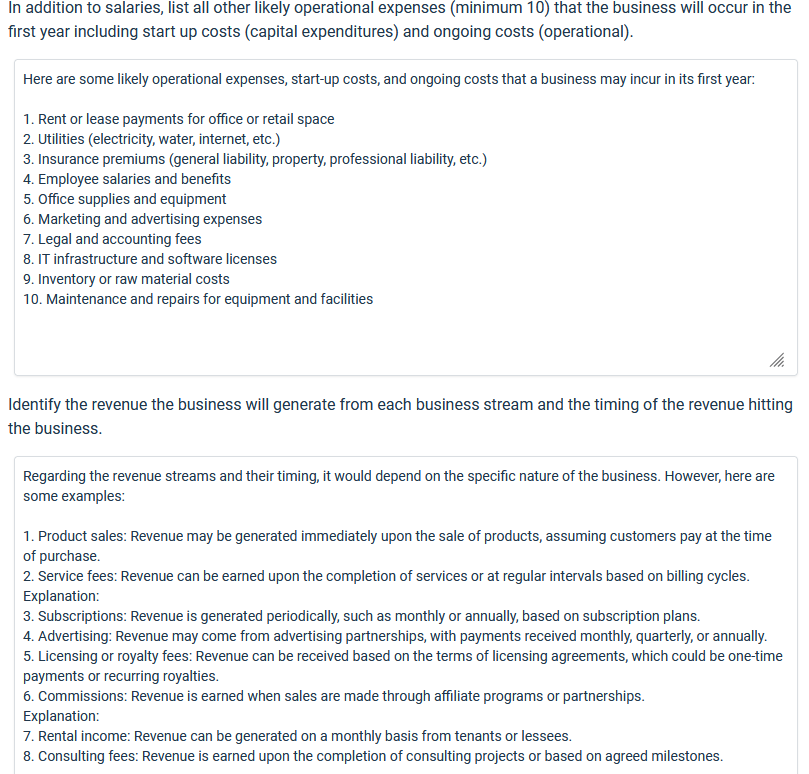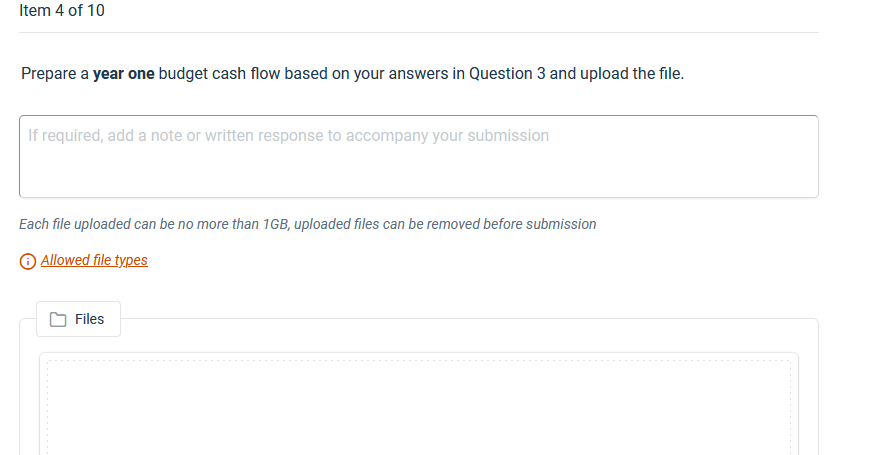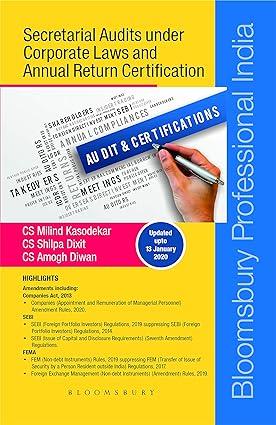 | | | | | | |
| | | | | | | |
| | | | | | | |
| | | | | | | |

In addition to salaries, list all other likely operational expenses (minimum 10 ) that the business will occur in the first year including start up costs (capital expenditures) and ongoing costs (operational). Here are some likely operational expenses, start-up costs, and ongoing costs that a business may incur in its first year: 1. Rent or lease payments for office or retail space 2. Utilities (electricity, water, internet, etc.) 3. Insurance premiums (general liability, property, professional liability, etc.) 4. Employee salaries and benefits 5. Office supplies and equipment 6. Marketing and advertising expenses 7. Legal and accounting fees 8. IT infrastructure and software licenses 9. Inventory or raw material costs 10. Maintenance and repairs for equipment and facilities Identify the revenue the business will generate from each business stream and the timing of the revenue hitting the business. Regarding the revenue streams and their timing, it would depend on the specific nature of the business. However, here are some examples: 1. Product sales: Revenue may be generated immediately upon the sale of products, assuming customers pay at the time of purchase. 2. Service fees: Revenue can be earned upon the completion of services or at regular intervals based on billing cycles. Explanation: 3. Subscriptions: Revenue is generated periodically, such as monthly or annually, based on subscription plans. 4. Advertising: Revenue may come from advertising partnerships, with payments received monthly, quarterly, or annually. 5. Licensing or royalty fees: Revenue can be received based on the terms of licensing agreements, which could be one-time payments or recurring royalties. 6. Commissions: Revenue is earned when sales are made through affiliate programs or partnerships. Explanation: 7. Rental income: Revenue can be generated on a monthly basis from tenants or lessees. 8. Consulting fees: Revenue is earned upon the completion of consulting projects or based on agreed milestones. Prepare a year one budget cash flow based on your answers in Question 3 and upload the file. If required, add a note or written response to accompany your submission Each file uploaded can be no more than 1GB, uploaded files can be removed before submission In addition to salaries, list all other likely operational expenses (minimum 10 ) that the business will occur in the first year including start up costs (capital expenditures) and ongoing costs (operational). Here are some likely operational expenses, start-up costs, and ongoing costs that a business may incur in its first year: 1. Rent or lease payments for office or retail space 2. Utilities (electricity, water, internet, etc.) 3. Insurance premiums (general liability, property, professional liability, etc.) 4. Employee salaries and benefits 5. Office supplies and equipment 6. Marketing and advertising expenses 7. Legal and accounting fees 8. IT infrastructure and software licenses 9. Inventory or raw material costs 10. Maintenance and repairs for equipment and facilities Identify the revenue the business will generate from each business stream and the timing of the revenue hitting the business. Regarding the revenue streams and their timing, it would depend on the specific nature of the business. However, here are some examples: 1. Product sales: Revenue may be generated immediately upon the sale of products, assuming customers pay at the time of purchase. 2. Service fees: Revenue can be earned upon the completion of services or at regular intervals based on billing cycles. Explanation: 3. Subscriptions: Revenue is generated periodically, such as monthly or annually, based on subscription plans. 4. Advertising: Revenue may come from advertising partnerships, with payments received monthly, quarterly, or annually. 5. Licensing or royalty fees: Revenue can be received based on the terms of licensing agreements, which could be one-time payments or recurring royalties. 6. Commissions: Revenue is earned when sales are made through affiliate programs or partnerships. Explanation: 7. Rental income: Revenue can be generated on a monthly basis from tenants or lessees. 8. Consulting fees: Revenue is earned upon the completion of consulting projects or based on agreed milestones. Prepare a year one budget cash flow based on your answers in Question 3 and upload the file. If required, add a note or written response to accompany your submission Each file uploaded can be no more than 1GB, uploaded files can be removed before submission








